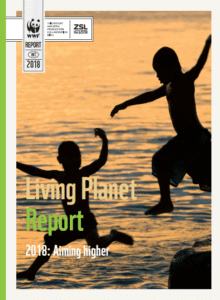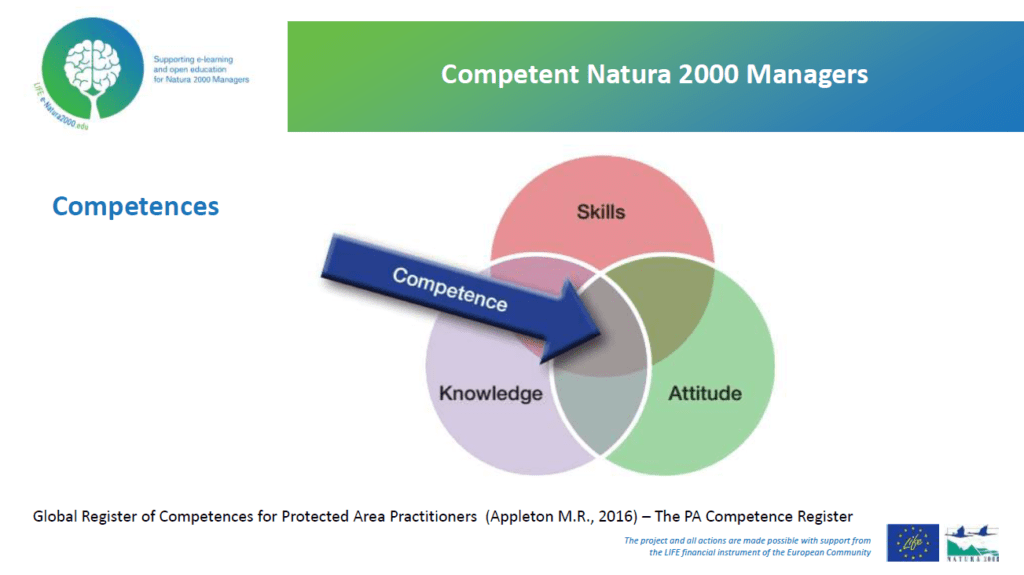We have an appointment with the future!
Keen eyes looking to the future © Belovezhskaya Pushcha National Park (BO)
Article issued by Ignace Schops, EUROPARC President
“Faith is the bird that feels the light and sings when the dawn is still dark”.

Flattened Earth, by Frits Ahlefeldt, https://hikingartist.com/
This quote of Rabindranath Tagore expresses so beautifully and deeply what the Club of Rome stated in the book “Limits to growth”, back in 1972. The Club of Rome knew we were trespassing the limits. And we still are!
Report after report we witness the collapse of our planet. And although the world is achieving good results in certain domains like poverty and education, we are destroying what keeps us alive. Strangely, there is a kind of inaction to prevent mass species extinction and climate breakdown.
Humanity has wiped out 60% of mammals, birds, fish and reptiles since 1970.
The new Living Planet Report 2018 of WWF is very clear. All indicators show a colossal loss, leading the world’s foremost experts to warn that the destruction of wildlife is now an emergency that threatens civilization. Marco Lambertini, director general of WWF International, says: ”we can no longer ignore the impact of current unsustainable production models and wasteful lifestyles.”
Rightly so! We urgently need to shift from a linear economy towards a circular economy! It is like Thomas Rau points out.
- Products are designed to fail (new = almost broken);
- designed for the bin (new = waste);
- designed to be outdated (new today, history tomorrow)
- and designed to be out-fashioned (new = no need, but a desire).
We urgently need a radical shift towards circularity where:
- our products are designed to perform (new = almost never broken);
- designed to be circular (waste = food);
- designed to be outstanding (new today = stable tomorrow)
- and designed to sustain (new = a desirable need).
The (fundamental) keyword
In times of mass species decline, we have to stay focused and try to see the bird behind the elephant. The good news is that nature conservation and rewilding efforts can work! Wolves and lynxes in protected areas in Europe, Pandas in protected areas in China, and tigers in protected areas in India. The keyword is “protected area”.
In protected areas, species and habitats survive or suffer less. Aware of these facts, the EUROPARC Federation has developed tools where people can live in harmony wildlife. The world needs to know what the environmental movement is capable of! Evidence-based!
There is nothing as practical than good theory. In 2020 the UN Convention on Biological Diversity will have an appointment with the future! New objectives and enforceable commitments for protection of nature will be designed. Give the floor to the great Edward O. Wilson with his important message to protect half earth for wildlife to protect ourselves!
… and hopefully, our song will be heard this time!
The Living Planet Report documents the state of the planet—including biodiversity, ecosystems, and demand on natural resources—and what it means for humans and wildlife. Published by WWF every two years, the report brings together a variety of research to provide a comprehensive view of the health of the Earth.
New ways for building professional capacities: needs & tools
As part of the EUROPARC Conference 2018, a dedicated workshop was organised for the LIFE Preparatory project, ‘Supporting e-learning and capacity building for Natura 2000 managers’. Seven participants from six countries worked together to discuss what makes an effective Natura 2000 manager. Based on participants’ experiences of capacity building we considered: who are Natura 2000 managers? What do they need to know and be able to do? And, how do they learn?
Who are Natura 2000 site managers?
Natura 2000 managers and protected area practitioners work on the ‘front-line’ of nature conservation and sustainable development. From the many possible different ‘types’ of Natura 2000 manager, the following are probably most recognisable: Site or area based nature conservation professionals; Nature reserve or park managers; Rangers; Specialist advisers and ecologists; Volunteers; Trainees/ students; Contractors (for example, involved in construction activities); Farmers and private landowners.
What do they need to know and be able to do?
The range of skills and knowledge required are extensive and vary from job to job. Taking into account the often technical demands of Natura 2000, the following topics can be identified as benefitting from specific capacity building initiatives and support:
- Provision of accurate and meaningful information – what Natura 2000 is and why it is necessary & important;
- Conservation management planning;
- Species & habitat management;
- Ecological assessment & monitoring;
- Habitat restoration;
- Clarification about legally required management priorities;
- Steps to improve technical site management;
- Enforcement with an emphasis on positive engagement strategies and approaches;
- Site interpretation.
Apart from being nature conservation specialists, Natura 2000 site managers are managers of people, as well as natural and cultural resources.
In order to achieve conservation needs and priorities often within complex settings, effective management relies on good team-working. Also, it involves working together with different nature conservation professionals, but also crucially multiple stakeholders, often from non-technical backgrounds. Most importantly of all, therefore, effective management of protected areas, and certainly Natura 2000 sites, requires and benefits from the positive engagement of different types of people.
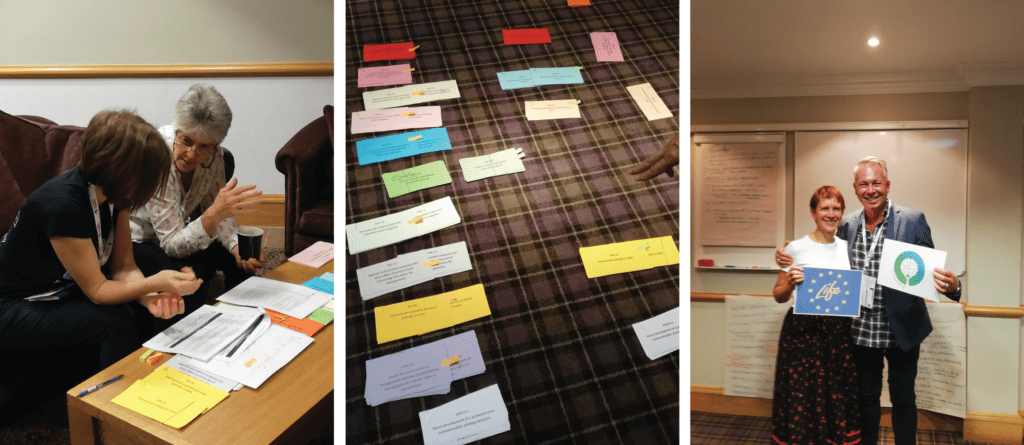
“New ways for building professional capacities” workshop at EUROPARC Conference 2018
Building professional capacities: what learning tools work best?
Protected area professionals and Natura 2000 managers benefit most from the following tools and methods:
- “Tell, show, do” approaches – nature conservation professionals are ‘hands-on’!
- Social media especially when that is ‘clean’, imaginative and stimulating – i.e. developed in such a way that avoids unnecessary clutter;
- Face-to-face learning, particularly as that is valuable in the development of effective ‘people skills’;
- Demonstration videos – especially where humour is combined with learning.
In terms of practical tools and how these could be used, the following are worth highlighting:
- Role play scenarios, especially useful in relation to effective conflict management;
- Interactive case studies, for example, in the form of PowerPoint slides – learning from different scenarios;
- Practical techniques – for example, different types of ice-breakers, how to use prompt cards, how to develop useful infographics;
- On-line / web-based tools which support peer-to-peer networking and knowledge transfers – the following were specifically identified as being useful:
- Dedicated platforms to support bilateral or multi-lateral ‘twinning’ to enable people to discuss common problems and develop shared solutions.
With respect to all learning tools, methods and approaches, workshop participants highlighted that they must be inclusive, respecting that people come from different backgrounds and will have different starting points. They should also appeal across generations and appeal to people of all ages.

Capacity Building in Europe – Ranger training in Romania © ProPark Foundation for Protected Areas
What are the most common capacity building needs?
Taking into account the complex contexts often involved, greater attention for capacity building is required generally. In terms of practical technical skills required for Natura 2000, information gaps and capacity building needs were identified in the following areas:
- Setting effective nature conservation objectives;
- Natura 2000 monitoring and survey practices – the potential to use new technologies in this area, such as drones and spatial photography were noted;
- Wildlife management;
- Habitat restoration techniques and determination of priority conservation measures.
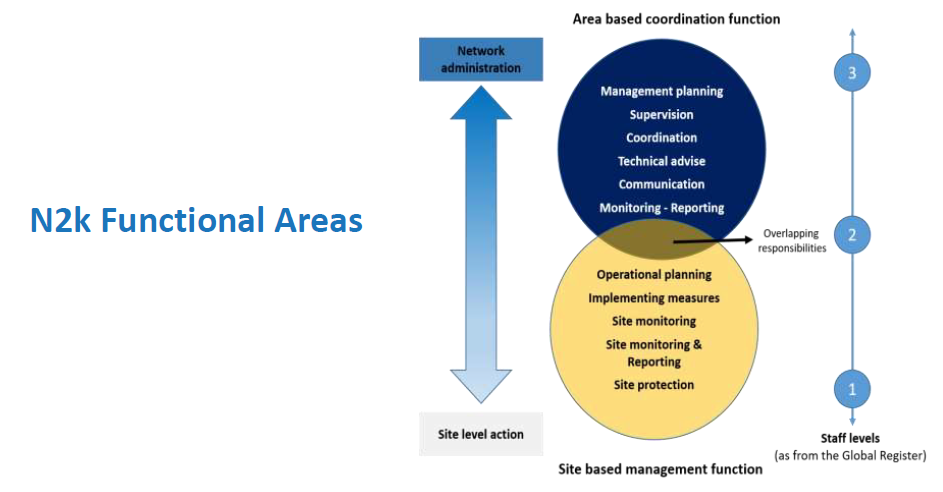
Functional Areas for Natura 2000 Managers – Click on the image to download the presentation “Competent Natura 2000 Managers “
Building “Soft Skills”
Natura 2000 is a network of sites but also essentially a network of people: therefore, interpersonal skills and competencies require specific attention. Capacity building in what are often called ‘soft skills’ is fundamental to their work – these include being able to manage, engage and motivate people, either within teams or within local communities. Specific capacity building needs were identified in the following areas:
- Communication & collaboration;
- Awareness raising & education (outreach);
- Community engagement / ‘animation territoriale’ – i.e. development and facilitation of inclusive participatory processes;
- Project management;
- Negotiation – dealing with diverse stakeholders, on-site and around site;
- Effective conflict resolution techniques and strategies;
- Effective definition of team roles and practical approaches to support team building;
Finally, linked to the theme of the 2018 EUROPARC Conference, ‘Inspired by the next generation’, there are significant opportunities to positively engage young people in ways that support the development of transferrable skills – for example, this includes building upon young peoples’ skills with new (digital) technologies whilst bringing them into contact with site managers who have practical experience.
Competence is at the crossroads between Knowledge, Skills and Attitude.
Looking to the future!
EUROPARC will continue to play an essential role, especially in facilitating networking that supports practical capacity building. Networking in ways that enable and support information sharing and knowledge transfer, exposure to existing best practice experiences, access to new learning techniques and practical insights, are invaluable.
We recognise the pressures on time and also financial resources: whilst face-to-face networking opportunities are highly regarded and extremely valuable, EUROPARC’s experience with and commitment to developing new and innovative online/ remote learning methods will be further expanded in future.
Download the workshop presentation: New ways for building professional capacities
Capacity building actions which EUROPARC can facilitate and help to promote include:
- Helping to identify hosts (for networking events);
- Providing practical support and technical assistance where possible;
- Stimulate more interaction across the EUROPARC network – mix everyone up;
- Continue to support exchange of best practices, especially in relation to community engagement;
- Development of solution-based face-to-face and online learning activities;
- Encourage interactivity and ask people to test what works or does not work in practice – generate and positively use feedback.
Finally, we are keen to explore ways to attach some forms of professional accreditation for capacity building actions. Whilst recognising that this may be more complex and longer-term, this could be an important way to advance protected areas managers’ and Natura 2000 managers’ professional development needs.
About the project
LIFE e-Natura2000.edu is a three-year project that explores the potential of building new approaches and learning methods to improve knowledge and build capacity amongst Natura 2000 Managers in both public and private land, across the EU. The project will test a mix of innovative e-learning tools and methods to access information and connect peers: throughout, the project will focus on what managers need to know and be able to do. We will engage a representative range of managers across the EU – site based staff, private landowners, PA staff, rangers etc. – and work with a core group of 60 project participants & 500 other ‘casual users’.
From 2019, three core modules and ‘blended learning’ experiences will be developed and rolled-out – on offer will be a mix of workshops, webinars, interactive online materials, demonstration video diaries, and a new web-based hub.
![]()
The project is led by EUROPARC with the support of six partners: ProPark, FUNGOBE Spain, the TESAF Department of the University of Padova, the European Landowners Organisation, Rangers Campus and the Kullaberg Nature Reserve. Taking a competence based approach, it aims to enable peers to connect and learn about what managers need to know and be able to do. The project will analyse capacity building needs and make available new ways to access information about the multiple skills required for Natura 2000 management and policy implementation.
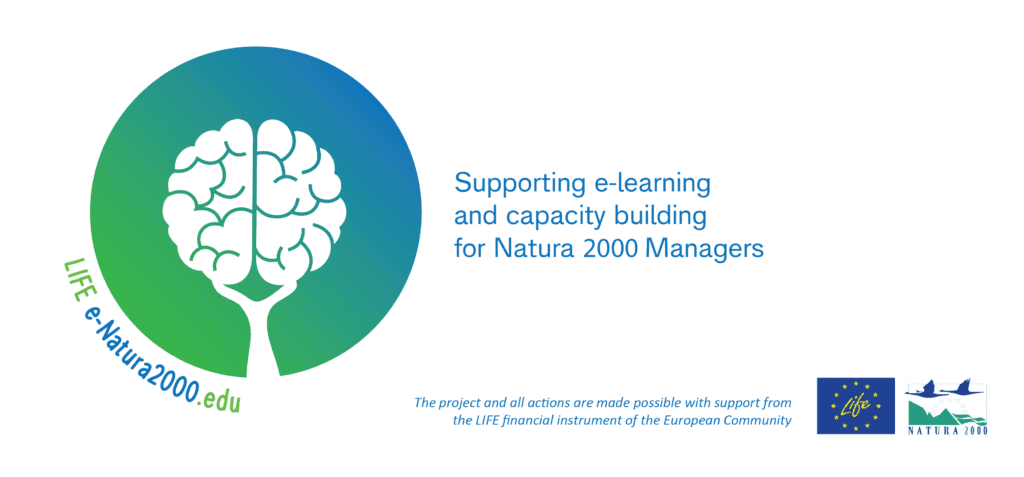
Charter Award Ceremony 2018: Registrations are open!
On the 29th November, 19 Sustainable Destinations will be awarded the European Charter for Sustainable Tourism in Protected Areas, in a Conference organised in the European Parliament. This year, the Conference is kindly hosted by the Member of the European Parliament Mr Paolo de Castro.
The ceremony will be an outstanding opportunity to look at the benefits that sustainable tourism strategies provide for people, environment and local economy within protected areas.
We will once more raise the voice of Protected Areas at the highest European institutional level, with the opportunity to share good practices and case studies from the ground. Members of the European Parliament, representatives of the European Commission and Members of the Committee of the Regions will contribute to the debate, providing the EU perspective, with highlights on recent policy developments and upcoming priorities.
Download the Programme here
Registrations are now open
Participation is free but registration is mandatory.
Special Side event: Wednesday, 28th November 18:30
All participants are invited by Puglia Region (Italy) to attend to the presentation of the project “LandXcape – art, storytelling, landscape”. Regione Puglia in Bruxelles – Rue du Trone, 62 – 5° floor. Light refreshments will be offered.
Please send a confirmation until 26th November to officio.bruxelles@regione.puglia.it
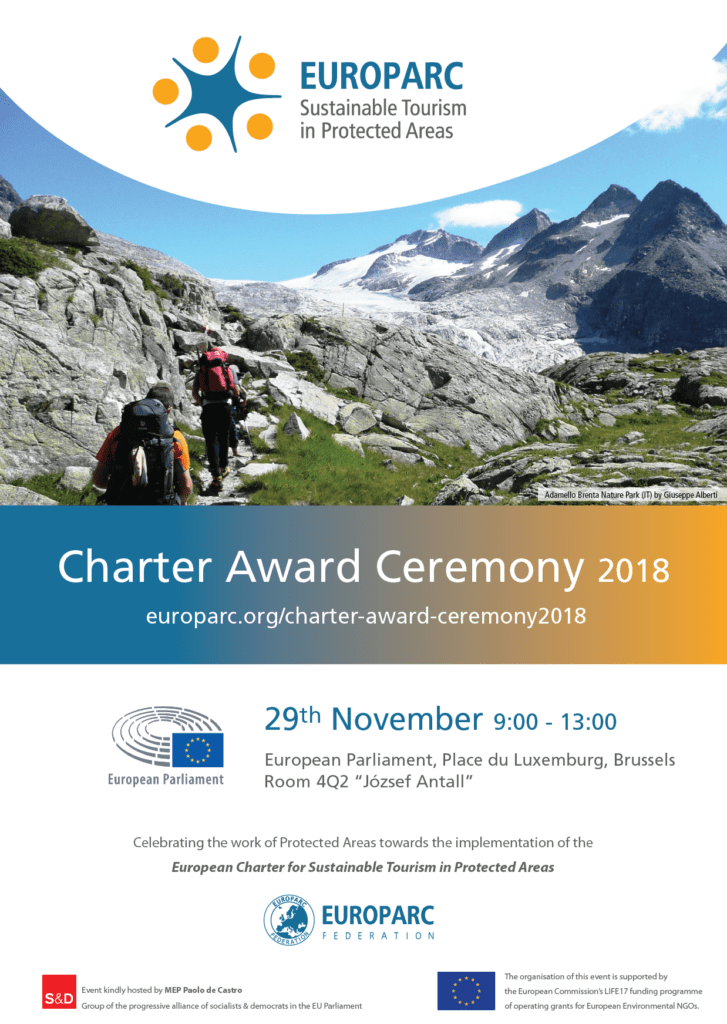
CEETO: Outcomes of the sustainable Tourism Conference in Croatia
The three-day International Conference on Protected Areas and Sustainable Tourism that took place in Opatija, organised by the CEETO project partners with the special involvement of the partner World Organization for Nature Protection WWF Adria, analysed the influence of tourism sector in decision-making, related to the management of protected areas. The Conference participants concluded that
we are all guests of nature and we should behave accordingly.
however, this is something seldom happening and that we need put in place – if we want to preserve the beautiful nature that surrounds us, in protected areas and Natura 2000 sites, and to ensure local communities benefit from such coexistence with nature.
“The tourism sector should recognise all the values of a particular protected area and, as a partner, participate in tourism management and in monitoring of the impact of tourism activities, especially visitation of the area,” said Andrea Štefan from WWF Adria while presenting the results of group work sessions with almost 80 participants of this conference that came from eight countries.
Improving Tourism in Protected Areas
Conference participants concluded that one way to keep track of whether tourism activities are sustainable is the use of existing European quality labels and methodologies in which natural values need to be integrated. The tourism sector representatives should be partners in new major topics such as climate change, but also participate in creating and ensuring financial resources for protected areas.
“Protected areas should work with all stakeholders to achieve sustainability in their area. Stakeholders should also be allowed to participate in decision-making process which is impossible to achieve without support from the top level. This is the only way they can participate in the development of local economies, which is necessary for everyone“, concludes Štefan, adding that the goals of education and interpretation within protected areas can be achieved through the creation of tourist offers.
For that, it is fundamental that each protected area establishes a member of staff dedicated to tourism development, who knows how to establish and maintain a relationship with the local community. Building mutual trust takes time but the results can be very positive.
The CEETO Project
Within the CEETO project, eight protected areas, which are also Natura 2000 sites, will pilot test innovative management and monitoring tools based on the EUROPARC Charter for Sustainable Tourism in Protected Areas methodology. The objective is to establish an innovative governance system for sustainable tourism based on a participatory approach. With a special focus on the impact of tourism on biodiversity in these areas, the project will improve the capacity of protected area managers for the sustainable management and use of natural values.
The Conference on Protected Areas and Sustainable Tourism was organized within the framework of the project “Ecotourism of Central Europe: Tools for Nature Protection – CEETO” co-financed by the European Regional Development Fund funds within the Interreg Central Europe program.
susta
